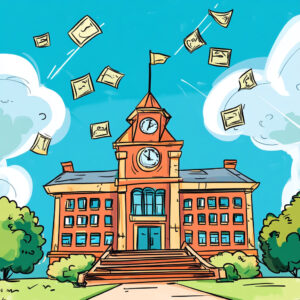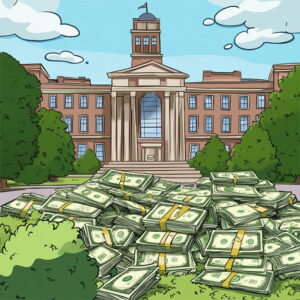 In the face of real problems, the Republican legislature of my adopted state of Florida has been busy addressing fictional problems and undermining democracy. For example, HB 233, the “Viewpoint Diversity” bill, was signed by Governor DeSantis. When Republicans were asked for examples of problems the bill was intended to address, they could only refer to some parents being worried about things that might happen because the Republicans had been scaring them about things that have not happened. This is obviously the best possible justification for expanding the coercive power of the state.
In the face of real problems, the Republican legislature of my adopted state of Florida has been busy addressing fictional problems and undermining democracy. For example, HB 233, the “Viewpoint Diversity” bill, was signed by Governor DeSantis. When Republicans were asked for examples of problems the bill was intended to address, they could only refer to some parents being worried about things that might happen because the Republicans had been scaring them about things that have not happened. This is obviously the best possible justification for expanding the coercive power of the state.
I am a member of the United Faculty of Florida, a union for faculty. As would be expected, Florida Republicans do not like this union any more than they like most other unions, the police unions being a notable and expected exception. The Republican ideal seems to be that employees should face off against institutions and businesses as isolated individuals, operating from a position of weakness. Engaging with an employer as an individual is like trying to play alone against a full football team: the worker is going to get crushed. I do admit the obvious: unions can have problems. But pointing to things unions have done wrong no more proves that unions are inherently bad than pointing to things employers have done wrong proves that employers are inherently bad.
As would be expected, the UFF sent an email informing us of the law and making recommendations on how to teach in the climate it created. One provision of the law is that students can record lectures without notice and without consent; although there are some limits on how the recordings can be used. As is often the case with Republican laws, this seems to already be allowed by existing laws.
In Florida, it is a crime to record a person without their consent. The exception is for in-person communication when all the parties do not have a reasonable expectation of privacy. An example of this would be holding a conversation in a public space where they could be overheard. A reasonable case can be made that a classroom in a public university is a public space and there is no expectation of privacy when a professor is lecturing. Naturally, there can be cases in the classroom where privacy is expected. For example, if I am speaking to a student after class about their grade and someone is hiding in the hallway recording us, then they would seem to be breaking the law. While I am not a lawyer, I had always operated under the assumption that my lectures could be recorded by students without breaking this wiretapping law: I do not believe that I have an expectation of privacy when I am teaching a class at my public university. That said, a case can be made for such an expectation of privacy.
One could argue that the classroom at a public university is not a public space where there is no expectation of privacy. After all, at class time the classroom is intended for the students enrolled in the class and there is a mechanism for auditing the class. As such, a professor could contend that they have an expectation that the lecture will only be heard by the students enrolled in the class. The class is private for the students and the fact that there are many students does not eliminate the expectation of privacy. I am sympathetic to this view, especially if one considers the students in the class.
Students often, perhaps wrongly, think of the classroom as a private space in terms of being able to express themselves and even to bring up personal matters. For example, a student might want to discuss an incident in which they were the victim of a crime during a course on criminal justice or ethics. As another example, student with atheist parents might want to discuss aspects of their faith in a religion class. If a student is secretly recording the classes, these students will end up in the recordings. As such, one impact of this law might be that students will be even more reluctant to talk in class. In any case, they do have the moral right to know that one of their number might be recording everything in the classroom. I obviously have a moral obligation to inform my students that this is something that can happen.
In my case, the law changed little. I have been recording my classes for years. Students have never asked to not be recorded, but they have always had the moral right to make this request in my classes. But defenders of the law can argue that students should not be worried because the law limits how these secret, non-consensual recordings can be used.
Lectures are presumably protected by copyright laws, and the law seems to respect this somewhat. Such recordings can be used only “for a student’s own personal educational use”, “in connection with a complaint to the public institution of higher education where the recording was made” and “as evidence in, or in preparation for, a criminal or civil proceeding.”
The first use might strike some as very generous; imagine, for example, if a law allowed people to take a camera to a commercial play or movie and record the show for their own personal use later. That said, people are allowed to make recordings in certain contexts for later viewing, so one could take that as the better analogy.
The second use seems a bit vague and perhaps would allow some abuse, but one could argue that students have a right to record evidence they will use as the basis of a complaint. That said, there is already an existing complaint process and, as noted above, the Republicans have not provided evidence that there is a significant problem that would warrant a new law. But this is to be expected, since the intent of the law seems to be not to protect students but to intimidate professors.
The third use would probably strike most as eminently reasonable: if a professor is doing crimes in the classroom, then they would be hard pressed to make a moral or legal case for a right to do crimes in private. But, as has often been noted, the Republicans have not provided evidence that this is a significant problem or that the matter was not adequately addressed by existing laws.
If a recording is used for other purposes, a faculty member can seek damages of up to $200,000. But, of course, people can already sue anyone for anything, so putting this in the law just limits the damages. Students do, of course, have an easy workaround: they can record a lecture, make a complaint and then the video could end up a matter of public record.
Since I have been recording and distributing my lectures for years, I was and am not worried about the impact of the law on me. However, I was concerned about the intent of the law. One clear motivation was to rile up the base and create the illusion that the Republicans are solving a problem (they made up). It also allows the Republicans to say they are “owning the libs.” This seems to be much more important to them then engaging in real governance. The most worrisome motivation is that this law is intended as a Soviet style threat to faculty: “anyone in your class could be a spy, so you had better watch what you say, comrade.”
The right has long been interested in “spying” on professors and in 2006 a right wing group even offered to pay students to do just that. This tactic of spying goes beyond the classroom and includes attempts to infiltrate political organization. As a counter, one might contend that the media also engages in “spying” operations to gather information about groups. However, there are important differences between an investigation conducted by a professional media organization and partisan “spying.” A key difference is that a professional investigation is aimed at determining the truth of the matter, while partisan “spying” is aimed at a political agenda and hence includes a willingness to distort and mislead. I am, of course, aware of the right-wing view that the liberal media is biased. To the degree that this claim has merit, I would certainly share their concerns.
In closing, my classes include a concise and neutral statement to my students making it clear they have every right to record my class in accord with this law. I also make it clear that they should always keep in mind that someone could be recording them in the class without their knowledge or consent.

 Long ago, when I was a student, student loans were mostly manageable. Over the years, the cost of college has increased dramatically, and student loans have become increasingly burdensome. There is also the issue of predatorial for-profit schools. Because of this debt burden, there have been proposals to address the student loan problem. Some have even proposed forgiving or cancelling student loans. This proposal has generated hostile responses,
Long ago, when I was a student, student loans were mostly manageable. Over the years, the cost of college has increased dramatically, and student loans have become increasingly burdensome. There is also the issue of predatorial for-profit schools. Because of this debt burden, there have been proposals to address the student loan problem. Some have even proposed forgiving or cancelling student loans. This proposal has generated hostile responses,  As professors we worry students will use AI to cheat (until it takes our jobs). But we can also transform AI into a useful and engaging teaching assistant by creating AI personas tailored to our classes.
As professors we worry students will use AI to cheat (until it takes our jobs). But we can also transform AI into a useful and engaging teaching assistant by creating AI personas tailored to our classes. My name is Dr. Michael LaBossiere, and I am reaching out to you on behalf of the CyberPolicy Institute at Florida A&M University (FAMU). Our team of professors, who are fellows with the Institute, have developed a short survey aimed at gathering insights from professionals like yourself in the IT and healthcare sectors regarding healthcare cybersecurity.
My name is Dr. Michael LaBossiere, and I am reaching out to you on behalf of the CyberPolicy Institute at Florida A&M University (FAMU). Our team of professors, who are fellows with the Institute, have developed a short survey aimed at gathering insights from professionals like yourself in the IT and healthcare sectors regarding healthcare cybersecurity. While there are arguments in favor of school choice that transfers public money to private schools, many of them focus on the benefits to those able to leave public schools. Those left behind seem largely ignored. This is a problem.
While there are arguments in favor of school choice that transfers public money to private schools, many of them focus on the benefits to those able to leave public schools. Those left behind seem largely ignored. This is a problem. In the previous essay, I considered some arguments in favor of school vouchers. Another set of arguments focus on the choice aspect, that vouchers allow parents to select the education that best fits their children and that will cultivate the desired values. For example, choice proponents claim that vouchers enable parents of children with special needs to pick a tailored program not available in public schools. An obvious reply to these arguments is that the main reason public schools lack tailored programs is that they are underfunded. Schools could offer tailored programs if they had the funding and diverting public money to vouchers makes less sense than funding these programs. This would be like arguing that public money should be diverted from community rec centers to private gyms because the rec centers lack the variety of equipment possessed by private gyms. If the equipment is critical for the community, then the funding should be used to get that equipment for the rec centers rather than funneling money into private gyms.
In the previous essay, I considered some arguments in favor of school vouchers. Another set of arguments focus on the choice aspect, that vouchers allow parents to select the education that best fits their children and that will cultivate the desired values. For example, choice proponents claim that vouchers enable parents of children with special needs to pick a tailored program not available in public schools. An obvious reply to these arguments is that the main reason public schools lack tailored programs is that they are underfunded. Schools could offer tailored programs if they had the funding and diverting public money to vouchers makes less sense than funding these programs. This would be like arguing that public money should be diverted from community rec centers to private gyms because the rec centers lack the variety of equipment possessed by private gyms. If the equipment is critical for the community, then the funding should be used to get that equipment for the rec centers rather than funneling money into private gyms. While strong support for public education has been bipartisan at times, it is now split along ideological grounds Most opposition to vouchers is from the left and they use various standard arguments. First, it is argued that the voucher system is intended to transfer public money to private businesses, thus making it a form of “wealthfare” in which public money benefits the well-off. Second, it is argued that vouchers take money from underfunded public schools that desperately need funding. Florida does very badly in spending per student and is at the bottom of the states for teacher pay. There are many unfilled teaching positions, schools have broken air-conditioning, and teachers routinely buy their own classroom supplies. Third, it is argued that vouchers are often a way to channel public money into religious institutions through their schools and using taxpayer money to fund churches is unconstitutional and wrong. Fourth, it is argued that the voucher system is intended to undermine public education to maintain the existing class structure and undermine democracy. While I agree with these arguments, it is worth considering the claimed merits of vouchers. After all, to simply embrace or shun something solely on ideological grounds would be to reject critical thought. As such, I will consider some of the reasons advanced in favor of voucher programs.
While strong support for public education has been bipartisan at times, it is now split along ideological grounds Most opposition to vouchers is from the left and they use various standard arguments. First, it is argued that the voucher system is intended to transfer public money to private businesses, thus making it a form of “wealthfare” in which public money benefits the well-off. Second, it is argued that vouchers take money from underfunded public schools that desperately need funding. Florida does very badly in spending per student and is at the bottom of the states for teacher pay. There are many unfilled teaching positions, schools have broken air-conditioning, and teachers routinely buy their own classroom supplies. Third, it is argued that vouchers are often a way to channel public money into religious institutions through their schools and using taxpayer money to fund churches is unconstitutional and wrong. Fourth, it is argued that the voucher system is intended to undermine public education to maintain the existing class structure and undermine democracy. While I agree with these arguments, it is worth considering the claimed merits of vouchers. After all, to simply embrace or shun something solely on ideological grounds would be to reject critical thought. As such, I will consider some of the reasons advanced in favor of voucher programs. As noted in previous essays, competition over opportunities is usually unavoidable and can be desirable. However, this competition can do more harm than good. One example of this is opportunity hoarding. Opportunity hoarding occurs when parents try to seek
As noted in previous essays, competition over opportunities is usually unavoidable and can be desirable. However, this competition can do more harm than good. One example of this is opportunity hoarding. Opportunity hoarding occurs when parents try to seek  The fact that college admission is for sale is an open secret. As with other forms of institutionalized unfairness, there are norms and laws governing the legal and acceptable ways of buying admission. For example, donating large sums of money or funding a building to buy admission are within the norms and laws.
The fact that college admission is for sale is an open secret. As with other forms of institutionalized unfairness, there are norms and laws governing the legal and acceptable ways of buying admission. For example, donating large sums of money or funding a building to buy admission are within the norms and laws.